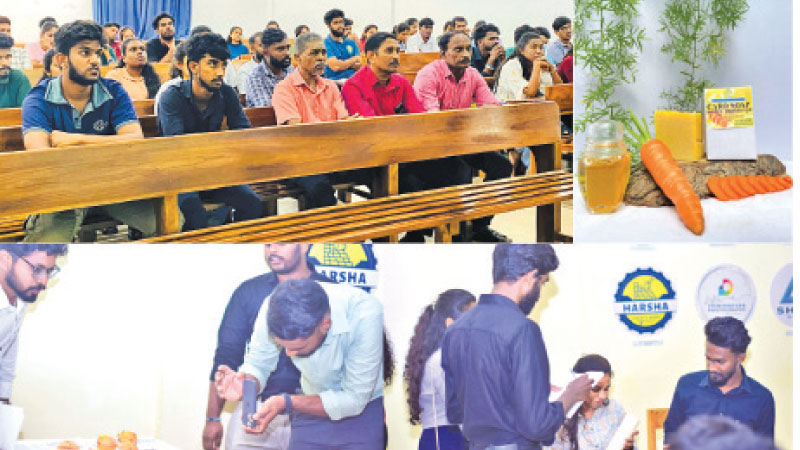
Dr. (Mrs.) Dilogini Sangarathas
In a time of changing digital marketing trends weekly and google algorithms changing overnight, education that is solely reliant on textbooks is no longer effective. For too long do students sit in lecture halls and memorise theoretical concepts, out-of-date case studies, and leave university unprepared for the rapid pace of the digital marketplace. Recognising this opportunity, a new teaching approach was developed that allows students to steer their own learning, while learning digital marketing not by reading about it, but by doing it. The new approach infuses Participatory Action Research (PAR) into an undergraduate digital marketing course. While typical research involves the student remaining as a passive observer, PAR allows the learner to take an active role. When used, with Undergraduate Research Experiences (UREs), students can practice skillsets while having a meaningful, real-world impact on local businesses. Not only does it lead to better graduates, but it gives capacity to the community while closing the digital divide for many small businesses.
Where Classrooms Meet Communities
With this exciting framework, the classroom is much larger than the confines of a university. Two consecutive batches of Marketing Bachelor’s graduates worked side by side with ten Micro, Small and Medium Enterprises (MSMEs) scattered across Sri Lanka. These were not simulations or hypothetical projects, each student team collaborated with real business owners to identify barriers to their digital marketing and provide digital and practical solutions.
Most students did not merely develop strategies, they took action. Using narrative inquiry, photovoice, participatory mapping and focus group discussions, students and MSME owners co-researched questions like: How can this business reach new customers online? How can digital tools drive engagement? What is interrupting them to sell more on social media?
The research identified barriers experienced in common such as basic understanding of digital marketing, little or no online presences, and reluctance to use unknown digital tools. This research informed collaborative actions that had impact, with students as their business partners, and led to changed students and businesses.
Putting Ideas into Action
The students’ solutions were as diverse as the businesses themselves. Students worked with MSMEs’ Facebook Meta business and Instagram pages, developed engaging content, and trained the owners to manage their posts and respond to customers. Another team introduced an online payment system. At the same time, students produced Tik Tok video content, and created WhatsApp Business accounts to help MSME owners streamline customer communications. One MSME owner reported about running Facebook ads. He had never run Facebook ads before the student groups developed ad campaigns for him, and now he was excited to share that he could now design his own ads and review metrics each week.
Learning Goes Both Ways
What really sets this method apart is that it’s not only students helping MSMEs owners. There’s reciprocity. MSMEs owners have decades of business expertise and knowledge of the local market which helps students understand the contextual and customers actions at a fundamental level. At the same time, students contribute new views about digital trends and applications which somehow help demystify the digital world for business owners who seemed alienated from most of it.
Students are also mentoring each other. For example, senior batch undergraduates led workshops with junior students on navigating tools like Canva, Meta Business Suite, and other video editing tools. Peer learning contributes significantly because it too bridges experience gaps, as gathering and sharing knowledge becomes an equal part of the overall learning experience.
Impact Beyond the Classroom
The impact is real for both parties. For students, the action-participation model fills their portfolios with great projects, real campaigns with analytics reports, and case studies. This portfolio becomes important assets for students to draft as they continue into a job market that continues to become cluttered with new graduates, and many earn agency/start-up jobs immediately upon graduation. Employers also noticed that the graduates of this practice course received higher starting salaries and were able to report a much quicker transition to professional roles because they had engaged real clients and used real budgets.
The impact is also profound for MSME’s. Participating businesses reported considerable increases in brand recognition, customer engagement, and revenue.
The average reported increase in online engagement included! 30% improvement, and many reported that they were able to connect with consumers beyond their local region, with some organisations starting to ship to international buyers for the first time. One small business owner enthused this about partnering with students, “Before working with the students, I thought Facebook was only for chatting, now, it is where half my customers come from. I never thought my products could reach more buyers”.
Lessons Learned Along the Way
Certainly, establishing a new teaching model has its challenges. Some business owners were quite doubtful, and wondered if the students actually could offer useful help. Others had no reliable internet connectivity or devices. To address these challenges, students developed mobile responsive marketing plans as well as in-person training if there was no way to have an online meeting.
Faculty also transitioned, and shifted away from lecture/deliver learning, to a more mentor and facilitator role. They allowed student decision-making regarding their intervisitations, while offering guidance and establishing a sense of trust and accountability.
A Model Worth Expanding
This participatory action model illustrates what is possible when higher education actively engages in community development. By embedding real-world projects into course assignments and activities, universities can better prepare graduates entering the workforce in many geographic areas, the graduates are job-ready, empowered, and capable of problem-solving at a level far beyond the classroom.
Simultaneously, MSMEs discussed by many as the usually invisible players in the digital economy receive millions of dollars of free digital marketing “know-how”, addressing the “digital divide” that continues to stifle many local businesses on a regular basis. While this partnership may seem simple, the ramifications are considerable, the more competitive, viable businesses operate in the local economy, the more that populace is invested in the local economies, the more it inspires innovation, and inspires more local takers of digital marketing tools never mind other tools.
Given the current traction, the model has potential for adoption more broadly. This urban model could engage more often (referrals) in more rural settings, invite more industries to participate, and work with regional and national chambers of commerce for dissemination.
The model is lower on the spectrum of existing models like social enterprise, very flexible, and expandable, and exists on a large continuum that could be further contextualised to different communities (urban, rural) and cultures and objectives (ex. people taking the course for different reasons like business, career change, graduation/education credential, etc.).
A New Generation of Changemakers
At its heart, this approach to digital marketing education is about more than technical skills, it is about mindset. Students learn to become adaptable, community and stakeholder-oriented, and to not shy away from real problems. They transition from students to changemakers who can reimagine the gap between the past and the future.
One proud student said, “this course didn’t just teach me how to plan a campaign, it taught me how to listen, take in the information, and make a change”
In a world where the only constant is change, perhaps the best marketers are not the ones that are equipped with the latest tools, but those who use those tools to lift others along the way. Practicing, as opposed to theorising- that is how the next generation of digital marketing leaders is built.
Dr. (Mrs.) Dilogini Sangarathas,
PhD. in Marketing
Senior Lecturer,
Department of Marketing,
Faculty of Management Studies and Commerce,
University of Jaffna.







